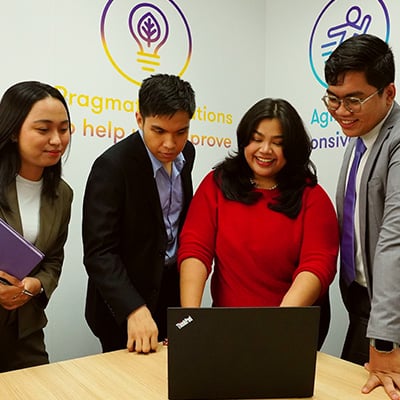-
Audit approach overview
Our audit approach will allow our client's accounting personnel to make the maximum contribution to the audit effort without compromising their ongoing responsibilities
-
Annual and short period audit
At P&A Grant Thornton, we provide annual and short period financial statement audit services that go beyond the normal expectations of our clients. We believe strongly that our best work comes from combining outstanding technical expertise, knowledge and ability with exceptional client-focused service.
-
Review engagement
A review involves limited investigation with a narrower scope than an audit, and is undertaken for the purpose of providing limited assurance that the management’s representations are in accordance with identified financial reporting standards. Our professionals recognize that in order to conduct a quality financial statement review, it is important to look beyond the accounting entries to the underlying activities and operations that give rise to them.
-
Other Related Services
We make it a point to keep our clients abreast of the developments and updates relating to the growing complexities in the accounting world. We offer seminars and trainings on audit- and tax-related matters, such as updates on Accounting Standards, new pronouncements and Bureau of Internal Revenue (BIR) issuances, as well as other developments that affect our clients’ businesses.
-
Tax advisory
With our knowledge of tax laws and audit procedures, we help safeguard the substantive and procedural rights of taxpayers and prevent unwarranted assessments.
-
Tax compliance
We aim to minimize the impact of taxation, enabling you to maximize your potential savings and to expand your business.
-
Corporate services
For clients that want to do business in the Philippines, we assist in determining the appropriate and tax-efficient operating business or investment vehicle and structure to address the objectives of the investor, as well as related incorporation issues.
-
Tax education and advocacy
Our advocacy work focuses on clarifying the interpretation of laws and regulations, suggesting measures to increasingly ease tax compliance, and protecting taxpayer’s rights.
-
Business risk services
Our business risk services cover a wide range of solutions that assist you in identifying, addressing and monitoring risks in your business. Such solutions include external quality assessments of your Internal Audit activities' conformance with standards as well as evaluating its readiness for such an external assessment.
-
Business consulting services
Our business consulting services are aimed at addressing concerns in your operations, processes and systems. Using our extensive knowledge of various industries, we can take a close look at your business processes as we create solutions that can help you mitigate risks to meet your objectives, promote efficiency, and beef up controls.
-
Transaction services
Transaction advisory includes all of our services specifically directed at assisting in investment, mergers and acquisitions, and financing transactions between and among businesses, lenders and governments. Such services include, among others, due diligence reviews, project feasibility studies, financial modelling, model audits and valuation.
-
Forensic advisory
Our forensic advisory services include assessing your vulnerability to fraud and identifying fraud risk factors, and recommending practical solutions to eliminate the gaps. We also provide investigative services to detect and quantify fraud and corruption and to trace assets and data that may have been lost in a fraud event.
-
Cyber advisory
Our focus is to help you identify and manage the cyber risks you might be facing within your organization. Our team can provide detailed, actionable insight that incorporates industry best practices and standards to strengthen your cybersecurity position and help you make informed decisions.
-
ProActive Hotline
Providing support in preventing and detecting fraud by creating a safe and secure whistleblowing system to promote integrity and honesty in the organisation.
-
Accounting services
At P&A Grant Thornton, we handle accounting services for several companies from a wide range of industries. Our approach is highly flexible. You may opt to outsource all your accounting functions, or pass on to us choice activities.
-
Staff augmentation services
We offer Staff Augmentation services where our staff, under the direction and supervision of the company’s officers, perform accounting and accounting-related work.
-
Payroll Processing
Payroll processing services are provided by P&A Grant Thornton Outsourcing Inc. More and more companies are beginning to realize the benefits of outsourcing their noncore activities, and the first to be outsourced is usually the payroll function. Payroll is easy to carve out from the rest of the business since it is usually independent of the other activities or functions within the Accounting Department.
-
Our values
Grant Thornton prides itself on being a values-driven organisation and we have more than 38,500 people in over 130 countries who are passionately committed to these values.
-
Global culture
Our people tell us that our global culture is one of the biggest attractions of a career with Grant Thornton.
-
Learning & development
At Grant Thornton we believe learning and development opportunities allow you to perform at your best every day. And when you are at your best, we are the best at serving our clients
-
Global talent mobility
One of the biggest attractions of a career with Grant Thornton is the opportunity to work on cross-border projects all over the world.
-
Diversity
Diversity helps us meet the demands of a changing world. We value the fact that our people come from all walks of life and that this diversity of experience and perspective makes our organisation stronger as a result.
-
In the community
Many Grant Thornton member firms provide a range of inspirational and generous services to the communities they serve.
-
Behind the Numbers: People of P&A Grant Thornton
Discover the inspiring stories of the individuals who make up our vibrant community. From seasoned veterans to fresh faces, the Purple Tribe is a diverse team united by a shared passion.
-
Fresh Graduates
Fresh Graduates
-
Students
Whether you are starting your career as a graduate or school leaver, P&A Grant Thornton can give you a flying start. We are ambitious. Take the fact that we’re the world’s fastest-growing global accountancy organisation. For our people, that means access to a global organisation and the chance to collaborate with more than 40,000 colleagues around the world. And potentially work in different countries and experience other cultures.
-
Experienced hires
P&A Grant Thornton offers something you can't find anywhere else. This is the opportunity to develop your ideas and thinking while having your efforts recognised from day one. We value the skills and knowledge you bring to Grant Thornton as an experienced professional and look forward to supporting you as you grow you career with our organisation.
The Bureau of Internal Revenue (BIR) issued Revenue Memorandum Circular (RMC) No. 77-2024, clarifying the taxpayer’s issues regarding invoicing requirements under the Ease of Paying Taxes (EOPT) Act and Revenue Regulations (RR) No. 7-2024, as amended by RR No. 11-2024.
Threshold in issuance of invoice
VAT-registered sellers are required to issue a VAT invoice for each sale transaction, regardless of the amount. On the other hand, non-VAT registered sellers are required to issue a non-VAT invoice when the amount of a single transaction is more than Php 500.00, or upon the request of the buyer for an invoice, regardless of the amount of the transaction, or when the aggregate amount of all sales transactions amounting to less than Php 500.00 exceeds the Php 500.00 threshold.
The Php 500.00 amount shall be adjusted to its present value every three (3) years, beginning January 22, 2024, or the effectivity of the EOPT Act, using the Consumer Price Index, as published by the Philippine Statistics Authority.
Conversion of official receipts to invoice
Sellers shifting from official receipt to invoice must apply for a new Authority To Print (ATP) invoice, with a separate set of serial numbers if using different types of invoices. Further, sellers have the option to continue using the official receipts as supplementary documents or to convert and use the remaining official receipts as invoice, until fully consumed.
Official receipts used as supplementary documents must be stamped with the phrase “This document is not valid for claim of input tax.” on each page. Failure to do so will not make the document a valid replacement for the invoice and may be subject to an applicable penalty. The last approved serial number of the official receipt must be continued when applying for a subsequent ATP for the official receipt as a supplementary document.
On the other hand, official receipts or billing statements or statements of account or statements of charges converted to invoice must be stamped “Invoice” or any name describing the transaction for which such invoice is issued, and the word “Official Receipt” or “Billing statement” or any similar name must be stricken out on the face of the manual and loose leaf printed documents, without any need for approval from the Revenue District Office (RDO) where the seller belongs. The conversion of such documents to invoice is allowed, provided that the converted invoice shall contain the required information under RR No. 7- 2024, as amended by RR No. 11-2024, such as quantity, unit cost, and description or nature of service. Any required missing information may be stamped on the document, if not originally included, upon conversion.
For manual and loose-leaf, the converted official receipts to invoice must be reported to the BIR through the submission of an inventory report (Annex C), indicating the number of booklets and serial numbers of the unused official receipts, no later than July 31, 2024. For point-of-sales machine or cash register machines or computerized accounting system with e-receipting, the renamed official receipt to invoice must be reported through the submission of a notice on the renaming of machine/system generated official receipt to invoice (Annex D), indicating the starting serial number of the converted invoice and the start date when such serial number is issued, no later than 30 days from completion of machine/system reconfiguration/enhancement or on December 31, 2024, whichever comes first. Any letter request for extension to enhance the system must be coursed through the concerned RDO, subject to final approval by the Regional Director or Assistant Commissioner, before December 31, 2024, stating the reason for the request for extension, target date of completion of enhancement, and email address and other contact details of the contact person.
Annexes C and D will be submitted to the RDO, where the head office or branch office is registered, or through the Taxpayer Registration Related Application (TTRA) or TTRA Portal. Sellers who have previously complied with the inventory report or letter notice are no longer required to resubmit.
Consequences on failure to comply with invoicing requirements
Failure to supply an invoice, as the primary document for the sale of goods or services, is subject to a penalty of not less than P1,000 but not more than P50,000 and imprisonment of not less than 2 years but not more than 4 years.
Sellers who are not VAT-registered and issued a VAT invoice are liable to 12% VAT without the benefit of any input tax credit and 50% surcharge, in addition to the percentage tax liability. On the other hand, VAT-registered sellers who issued VAT invoice without mandatory information, are liable for non-compliance with the invoicing requirements. However, the VAT amount is allowed to be claimed as input VAT on the part of the VAT-registered buyer, provided that the amount of sales, VAT amount, registered name and TIN of the buyer and seller, description of goods or services, and date of transaction are properly indicated on the face of the invoice.
Effectivity
The invoicing requirements and transitory provisions under RR No. 7-2024, as amended by RR No. 11-2024, implementing the EOPT Act is effective April 27, 2024, 15 days after the date of publication on the BIR official website on April 12, 2024. Further, all clarificatory provisions in RMC No. 77-2024 will take effect immediately upon posting on the BIR website on July 11, 2024.
Please be guided accordingly.
Source:
P&A Grant Thornton
Certified Public Accountants
P&A Grant Thornton is the Philippine member firm of Grant Thornton International Ltd.
As published in SunStar Cebu, dated 24 July 2024



